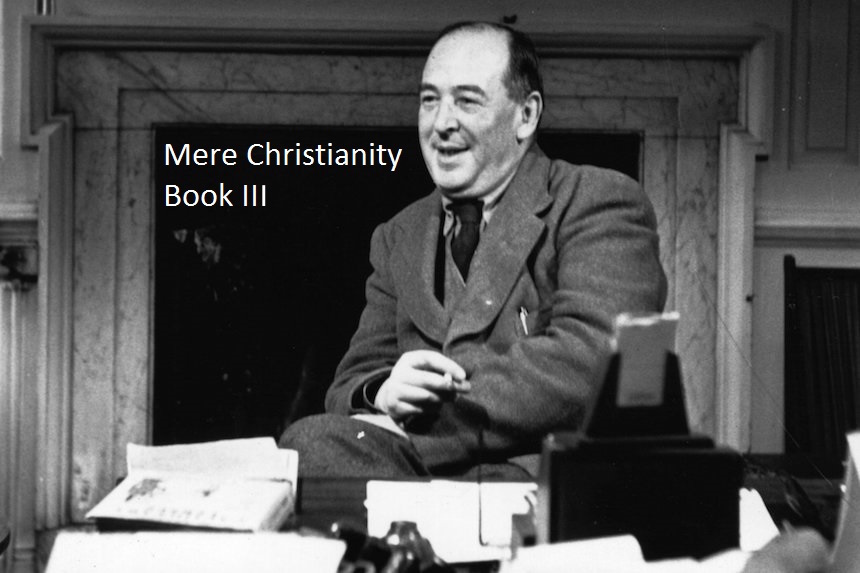Mere Christianity – Book III – Chapter 1 (“The Three Parts of Morality”)


Picking back up my notes for C.S. Lewis’ “Mere Christianity”…
Notes & Quotes
1. Many people think of morality as something which interferes, particularly with our enjoyment.
(a) However, morality is there for our own good.
“…moral rules are directions for running the human machine. Every moral rule is there to prevent a breakdown, or a strain, or a friction, in the running of that machine”
(b) What might initially seem right to us will cause problems.
“When you are being taught how to use any machine, the instructor keeps on saying, ‘No, don’t do it like that,’ because, of course, there are all sorts of things that look all right and seem to you the natural way of treating the machine, but do not really work”
2. Some people prefer to talk about “ideals” and “idealism” rather than “rules” and “obedience”.
(a) However, it is misleading to call moral perfection an ideal because it implies that it’s a private taste and therefore not binding on all
“When a man says that a certain woman…is ‘his ideal’ he does not mean…that everyone else ought to have the same ideal. In such matters we are entitled to have different tastes and, therefore, different ideals”
(b) It could lead to pride…
“It might lead you to become a prig and to think you were rather a special person who deserved to be congratulated on his ‘idealism'”
(c) …and this is as foolish as being congratulated in trying to not make a mistake in your arithmetic
“…you might just as well expect to be congratulated because, whenever you do a sum, you try to get it quite right. To be sure, perfect arithmetic is ‘an ideal’; you will certainly make some mistakes in some calculations. But there is nothing very fine about trying to be quite accurate at each step in each sum.
It would be idiotic not to try; for every mistake is going to cause you trouble later on. In the same way every moral failure is going to cause trouble, probably to others and certainly to yourself. By talking about rules and obedience instead of “ideals” and ‘idealism’ we help to remind ourselves of these facts”
3. Morality can be expressed in the metaphor of a fleet of ships
(a) The ships must have internal integrity and external integrity in relation to one another
“The voyage will be a success only, in the first place, if the ships do not collide and get in one another’s way; and, secondly, if each ship is seaworthy and has her engines in good order
…you cannot have either of these two things without the other. If the ships keep on having collisions they will not remain seaworthy very long. On the other hand, if their steering gears are out of order they will not be able to avoid collisions”
(c) Additionally, the final destination is fundamentally important
“…however well the fleet sailed, its voyage would be a failure if it were meant to reach New York and actually arrived at Calcutta”
4. An alternative metaphor is that of a musical band
“…think of humanity as a band playing a tune. To get a good result, you need two things. Each player’s individual instrument must be in tune and also each must come in at the right moment so as to combine with all the others.
…The instruments might be all in tune and might all come in at the right moment, but even so the performance would not be a success if they had been engaged to provide dance music and actually played nothing but Dead Marches”
5. We may therefore conclude that morality concerns three things:
(a) Exterior: Social relations with other humans
(b) Interior: The harmonising of the interior life
(c) Teleological: In relation to the purpose of man and his creator
6. When speaking about morality, modernity tends to ignore the last two
“When people say in the newspapers that we are striving for Christian moral standards, they usually mean that we are striving for kindness and fair play between nations, and classes, and individuals; that is, they are thinking only of the first thing”
(a) It is quite natural to focus on the first one because its effects are obvious and there is general agreement
“…the results of bad morality in that sphere are so obvious and press on us every day: war and poverty and graft and lies and shoddy work. And also, as long as you stick to the first thing, there is very little disagreement about morality”
(b) However, we can’t stop there…
“Unless we go on to the second thing-the tidying up inside each human being-we are only deceiving ourselves.
What is the good of telling the ships how to steer so as to avoid collisions if, in fact, they are such crazy old tubs that they cannot be steered at all? What is the good of drawing up, on paper, rules for social behaviour, if we know that, in fact, our greed, cowardice, ill temper, and self-conceit are going to prevent us from keeping them?”
(c) We must consider the individual’s morality (the “second thing”) because we rely upon it
“…nothing but the courage and unselfishness of individuals is ever going to make any system work properly
It is easy enough to remove the particular kinds of graft or bullying that go on under the present system: but as long as men are twisters or bullies they will find some new way of carrying on the old game under the new system. You cannot make men good by law: and without good men you cannot have a good society. That is why we must go on to think of the second thing: of morality inside the individual”
(d) We must also consider our purpose (the “third thing”)…
“…religion involves a series of statements about facts, which must be either true or false. If they are true, one set of conclusions will follow about the right sailing of the human fleet: if they are false, quite a different set”
(i) …because the answer to this question may reveal responsibilities
“…If somebody else made me, for his own purposes, then I shall have a lot of duties which I should not have if I simply belonged to myself”
(ii) …and because it makes a difference whether we live forever
“…there are a good many things which would not be worth bothering about if I were going to live only seventy years, but which I had better bother about very seriously if I am going to live for ever”
(A) Moral Trajectory
“Perhaps my bad temper or my jealousy are gradually getting worse – so gradually that the increase in seventy years will not be very noticeable. But it might be absolute hell in a million years: in fact, if Christianity is true, Hell is the precisely correct technical term for what it would be”
(B) The individual and society
“If individuals live only seventy years, then a state, or a nation, or a civilisation, which may last for a thousand years, is more important than an individual. But if Christianity is true, then the individual is not only more important but incomparably more important, for he is everlasting and the life of a state or a civilisation, compared with his, is only a moment”
7. Jack is going to assume the Christian point of view moving forward
“For the rest of this book I am going to assume the Christian point of view, and look at the whole picture as it will be if Christianity is true”
Discussion Questions
1. How do many people view morality? How does Jack present it?
2. Why should we not be surprised when we find that morality “interferes”?
3. What is the problem with talking about morals as “ideals”?
4. What are the two metaphors Jack uses to explain the different components of morality?
5. What are these three parts of morality? Around which parts are there consensus?
6. What can we not just stop at inter-personal morality? Why does interior morality matter? What are the consequences for society?
7. Why does it matter if we live forever?
 Today’s song is “At the cross” by Chris Tomlin:
Today’s song is “At the cross” by Chris Tomlin: I’ve had an interest in Islam for quite some time now. Particularly during the weeks when I was reading through the Qur’an, I would regularly have people ask me about the relationship between Islam and violence.
I’ve had an interest in Islam for quite some time now. Particularly during the weeks when I was reading through the Qur’an, I would regularly have people ask me about the relationship between Islam and violence.



